Abstract
Six male squirrel monkeys were subjected to a Sidman nondiscriminated avoidance schedule that superimposed conditioned stimuli (CS)—unavoidable shock pairings upon the ongoing avoidance behavior. Four of the six animals demonstrated facilitated avoidance response rates during the CS, while two demonstrated suppressed rates during the CS. Scopolamine hydrobromide (0.06, 0.125, 0.50, 1.0 mg/kg IM) reversed these patterns, causing the facilitators to suppress and vice versa. Scopolamine hydrobromide (0.50, 1.0 mg/kg) also led to a reliable reduction in overall response rate and an increase in the number of shocks received. Neither scopolamine methylbromide (0.50, 1.0 mg/kg), a peripheral acting anticholinergic, nor pilocarpine nitrate (1.25, 2.50 mg/kg), a muscarinic stimulant, produced any reliable effects upon avoidance behavior. These results were interpreted to indicate that the central acting antimuscarinic agent, scopolamine hydrobromide, may be able to reduce level of fear motivation either directly by interfering with cholinergic systems that mediate fear or by producing decrements in cognitive (i.e., memory) processes that are needed for animals to fully appreciate the aversive qualities of the CS.
Similar content being viewed by others
References
Annau, Z., Kamin, L. J.: The conditioned emotional response as a function of intensity of the US. J. comp. physiol. Psychol. 54, 428–432 (1961)
Berger, B. D., Stein, L.: An analysis of the learning deficits produced by scopolamine. Psychopharmacologia (Berl.) 14, 271–283 (1969a)
Berger, B. D., Stein, L.: Asymmetrical dissociation of learning between scopolamine and Wy 4036, a new benzodiazepine tranquilizer. Psychopharmacologia (Berl.) 14, 351–358 (1969b)
Bryant, R. C.: Conditioned suppression of free-operant avoidance. J. exp. Anal. Behav. 17, 257–260 (1972)
Daly, H. B.: Disruptive effects of scopolamine on fear conditioning and on instrumental escape learning. J. comp. physiol. Psychol. 66, 579–583 (1968)
Goldberg, M. E., Sledge, K., Hefner, M., Robichaud, R. C.: Learning impairment after three classes of agents which modify cholinergic function. Arch. int. Pharmacodyn. 193, 226–235 (1971)
Gooodman, L., Gilman, A.: The pharmacological basis of therapeutics. New York: MacMillan 1965
Herrnstein, R. J.: Effects of scopolamine on a multiple schedule. J. exp. Anal. Behav. 1, 351–358 (1958)
Herrnstein, R. J., Sidman, M.: Avoidance conditioning as a factor in the effects of unavoidable shocks on food-reinforced behavior. J. comp. physiol. Psychol. 51, 380–385 (1958)
Houser, V. P.: The effects of drugs upon a modified Sidman avoidance schedule that employs response independent shock. A preliminary report on cholinergic agents. Edgewood Arsenal Technical Report 4663, 1–25 (1972)
Houser, V. P.: Modulation of avoidance behavior in squirrel monkeys after chronic administration and withdrawal of d-amphetamine or alpha-methyl-p-tyrosine. Psychopharmacologia (Berl.) 28, 213–234 (1973)
Maier, S. M., Seligman, M., Solomon, R.: Pavlovian fear conditioning and learned helplessness: Effects on escape and avoidance behavior of (a) the CS-US contingency and (b) the independence of the US and voluntary responding. In: Punishment and aversive behavior, B. Campbell and R. Church, eds., pp. 299–342. New York: Appleton-Century-Crofts 1969
Myers, J. L.: Fundamentals of experimental design, pp. 170–173. Boston: Allyn and Bacon 1966
Pomerleau, O. F.: The effects of stimuli followed by response-independent shock on shock avoidance behavior. J. exp. Anal. Behav. 14, 11–21 (1970)
Rescorla, R. A.: Inhibition of delay in Pavlovian fear conditioning. J. comp. physiol. Psychol. 64, 114–120 (1967)
Samuel, G. K., Kodama, J. K., Mennear, H. J.: Effects of scopolamine and atropine and their quaternized salts on avoidance behavior in the monkey. Psychopharmacologia (Berl.) 8, 295–301 (1965)
Scobie, S. R.: Interaction of an aversive Pavlovian conditional stimulus with aversively and appetitively motivated operants in rats. J. comp. physiol. Psychol. 79, 171–188 (1972)
Scobie, S. R.: The response-shock interval and conditioned suppression of avoidance in rats. Anim. Learning and Behav. 1, 17–20 (1973)
Sepinwall, J.: Cholinergic stimulation of the brain and avoidance behavior. Psychon. Sci. 5, 93–94 (1966)
Sidman, M., Herrnstein, R. J., Conrad, D.: Maintenance of avoidance behavior by unavoidable shocks. J. comp. physiol. Psychol. 50, 533–557 (1957)
Sidman, M.: By-products of aversive control. J. exp. Anal. Behav. 1, 265–280 (1958)
Siegel, S.: Nonparametric statistics for the behavioral sciences, pp. 68–75. New York: McGraw-Hill 1956
Stein, L.: Reserpine and the learning of fear. Science 124, 1082–1083 (1956)
Vogel, J. R., Hughes, R. A., Carlton, P. L.: Scopolamine, atropine and conditioned fear. Psychopharmacologia (Berl.) 10, 409–416 (1967)
Waller, M. B., Waller, P. S.: The effects of unavoidable shocks on a multiple schedule having an avoidance component. J. exp. Anal. Behav. 6, 29–37 (1963)
Author information
Authors and Affiliations
Rights and permissions
About this article
Cite this article
Houser, V.P., Houser, F.L. The effects of agents that modify muscarinic tone upon behavior controlled by an avoidance schedule that employs signaled unavoidable shock. Psychopharmacologia 32, 133–150 (1973). https://doi.org/10.1007/BF00428684
Received:
Issue Date:
DOI: https://doi.org/10.1007/BF00428684




